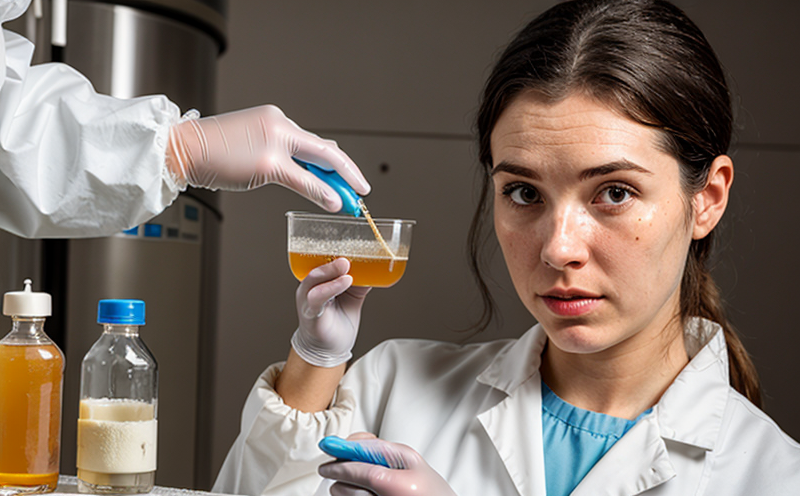Codex Fungal Contamination Standards for Dairy and Beverages
The Codex Alimentarius Commission's standards play a crucial role in ensuring food safety and quality worldwide. For the dairy and beverage industries, these standards are particularly important as they help prevent fungal contamination that could lead to spoilage or health hazards.
The Codex Fungal Contamination Standards for Dairy and Beverages address several key aspects including Aspergillus, Penicillium, and Mucorales. These fungi are common in environments where moisture levels are high, such as dairy production facilities. They can contaminate raw materials like milk, cream, and fruit juice concentrates during processing or storage.
The standards require that laboratories performing these tests follow internationally recognized methods to ensure accurate results. This includes using advanced microbiological techniques and analytical tools compliant with ISO 11731 for mold count in dairy products and ISO 16209-2:2018 for yeast and mold counts in beverages.
Compliance with these standards is essential not only to meet regulatory requirements but also to maintain consumer trust. In the case of milk, for instance, even small amounts of fungal contamination can lead to off-flavors or textures that affect product quality. Similarly, contaminated fruit juices may develop unusual colors or sedimentation issues.
The testing process involves several steps: sample collection from production lines or storage areas, appropriate preservation methods, inoculation into selective media, incubation conditions tailored for each type of fungus, and final quantification based on colony-forming units (CFUs).
Our laboratory adheres strictly to these procedures using state-of-the-art equipment such as automated counting systems and high-resolution microscopes. By doing so, we provide reliable data that helps manufacturers identify potential sources of contamination early in the supply chain.
In summary, understanding and adhering to Codex standards is vital for maintaining product integrity and safety within the dairy and beverage sectors. Our expertise ensures that clients receive accurate assessments which contribute directly towards their overall quality management goals.
Eurolab Advantages
At Eurolab, we pride ourselves on offering comprehensive testing services tailored to meet the unique needs of each client. Our experienced team combines scientific knowledge with practical experience to deliver precise results consistently.
- Accurate Results: Leveraging cutting-edge technology and rigorous adherence to international standards ensures that every test conducted by Eurolab meets high-quality benchmarks.
- Timely Deliveries: With streamlined processes in place, we can provide timely reports without compromising on accuracy or reliability.
- Comprehensive Reporting: Beyond mere quantitative data, our detailed reports offer valuable insights into what the findings imply for your business operations.
- Dedicated Client Support: Our customer service team is always available to answer any queries and guide you through the entire testing process from start to finish.
We understand that meeting regulatory requirements can sometimes be challenging, especially when dealing with complex biological samples like those encountered in dairy and beverage production. That's why Eurolab offers customized solutions designed specifically for your business environment.
Choose us as your partner in ensuring compliance with Codex standards, thereby safeguarding both the reputation of your brand and the health of consumers worldwide.
Competitive Advantage and Market Impact
Adhering to Codex fungal contamination standards provides numerous competitive advantages for dairy and beverage manufacturers. These include:
- Enhanced Consumer Trust: By demonstrating commitment to strict quality control measures, companies can build stronger relationships with their customers.
- Better Reputation Management: In today's interconnected world, maintaining a positive public image is crucial for long-term success. Meeting international standards helps protect brands from negative publicity associated with recalls or safety concerns.
- Increased Market Penetration: Companies that consistently uphold high standards tend to attract more business opportunities both domestically and internationally.
- Cost Efficiency: Early identification of issues via thorough testing can prevent costly rework later down the line, thereby optimizing operational efficiency.
In conclusion, following Codex guidelines is not just about compliance; it's an investment in future growth and sustainability. At Eurolab, we help our clients stay ahead of industry trends by providing robust support throughout their journey towards achieving these goals.
Use Cases and Application Examples
The Codex Fungal Contamination Standards have wide-ranging applications across various stages of the dairy and beverage supply chain. Here are some practical examples:
- Raw Material Inspection: Ensuring that raw milk or fruit juices do not contain unacceptable levels of fungi before processing helps avoid costly rejections downstream.
- Process Monitoring: Regular testing during production ensures that any signs of fungal growth are caught promptly, allowing for corrective actions to be taken immediately.
- Product Quality Control: Post-packaging tests verify that final products meet expected standards regarding mold and yeast counts. This step is especially important when dealing with shelf-stable items or those requiring extended storage periods.
- R&D Innovations: Researchers can use these tests to explore new ways of preventing fungal contamination, which could lead to novel product formulations or improved packaging solutions.
By integrating Codex standards into their workflows, companies ensure that they are producing safe and high-quality products consistently. This proactive approach not only protects consumers but also strengthens the company's position in competitive markets.





